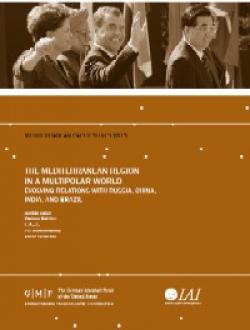The Mediterranean Region in a Multipolar World. Evolving Relations with Russia, China, India, and Brazil
With the United State's unipolar moment waning, the global power structure is changing. Nowhere is this felt more acutely than in the Middle East and North Africa (MENA). As the United States was withdrawing from Iraq, protests in the Arab world peaked, turning into a revolutionary wave that swept across North Africa, the Middle East, and the Gulf and that represents the most significant transformation in the region since decolonization. New power constellations are emerging and new leaders - spearheaded by Turkey, Egypt, and Qatar - are not only seeking to establish a more independent foreign policy, but also to assume more responsibility for their region. Taking advantage of a changing global power structure, Egyptian President Mohamed Morsi revealed his own "pivot to Asia" when he chose China as his first trip outside the Arab world. Indeed, not only are rising powers such as Brazil, Russia, India, and China (BRIC) playing an increasingly important role on the world stage, but - especially since the 2000s - they are also (re)entering the East and South Mediterranean region, as explored in this report. Russia, after an interruption caused by the disintegration of the Soviet Union, is returning as a stable and significant presence in the region. China also represents a growing power in the MENA, while India is an aspiring power that still has to overcome its "distant dilemma" toward the Mediterranean. Brazil is a complete newcomer to the region, but is slowly making its presence felt. How are these emerging powers' political, economic, and social interests in and ties to the region evolving? How have these been affected by the Arab uprisings? And what does this mean for transatlantic interests in the region? These are the three central question that four authors - Vladimir Bakhtin on Russia, Li Guofu on China, P.R. Kumaraswamy on India, and Arlene Clemesha on Brazil - address.
Paper produced within the framework of the IAI-GMF strategic partnership.
-
Details
Washington, German Marshall Fund of the United States, 2013, v, 35 p. -
Issue
21
Foreword, by Daniela Huber
1. Russia: Returning to a Stable Presence, by Vladimir Bakhtin
2. China: An Emerging Power in the Mediterranean, by Li Guofu
3. India: Overcoming the Distant Dilemma, by P.R. Kumaraswamy
4. Brazil: Newcomer to the Region, by Arlene Clemesha
Conclusion
References
Topic
Tag
Related content
-
Ricerca27/12/2013
Cooperation in the Mediterranean and the Middle East
leggi tutto



